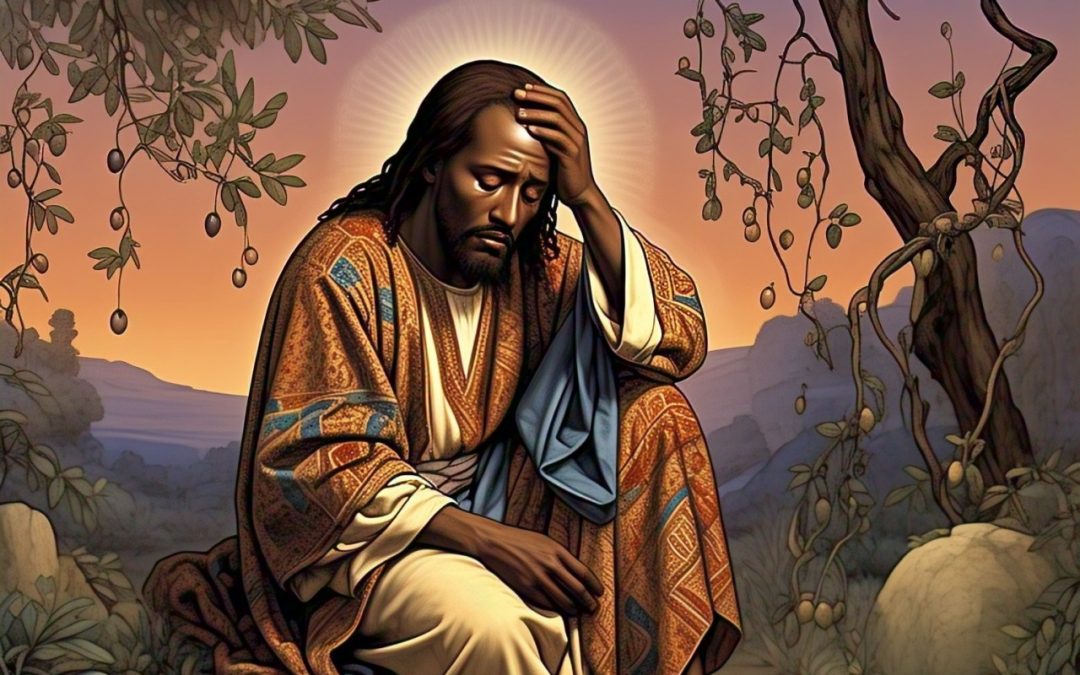
by Eron Henry | Apr 17, 2025 | Lent 2025
Maundy Thursday is a night where love and betrayal, communion and abandonment, authority and servanthood converge. The word “Maundy” derives from the Latin mandatum, meaning “commandment,” referring to Jesus’ words: “A new commandment I give to you, that you love one another: just as I have loved you, you also are to love one another” (John 13:34).
This night begins with an extraordinary act of humility. The Creator of the universe removes His outer garments, wraps a towel around His waist, and kneels before His disciples to wash their feet; a task reserved for the lowest servants. Peter’s initial resistance reflects our own reluctance to accept the radical nature of God’s self-emptying love. Yet Jesus insists: “If I do not wash you, you have no share with me.” In this reversal of human hierarchy, we witness divine love expressing itself not through domination but through service.
At the table, Jesus transforms the Passover meal into something altogether new. Taking bread and wine—ordinary elements of sustenance—He imbues them with extraordinary significance: “This is my body… This is my blood.” With these words, He establishes a memorial that will transcend time and culture, inviting believers across millennia to participate in His sacrifice. The meal that commemorated Israel’s deliverance from Egyptian bondage now points toward humanity’s deliverance from sin and death.
As the night deepens, Jesus leads His disciples to Gethsemane. Here, in the quiet darkness of an olive grove, we witness the full humanity of Christ. “My soul is very sorrowful, even to death,” He confesses to His closest friends. Three times He prays for the cup of suffering to pass from Him; three times He concludes with perfect submission: “Nevertheless, not my will, but yours, be done.” The struggle is real, yet His surrender is complete.
The night culminates in betrayal. With a kiss—a sign of affection twisted into treachery—Judas identifies Jesus to the arresting party. The disciples, despite their earlier protestations of loyalty, scatter into the darkness. The One who had just washed their feet and broken bread with them now stands alone, abandoned by all but the Father.
Maundy Thursday invites us to contemplate the cost of love that gives itself completely, the beauty of a God who serves rather than demands service, and the mystery of communion that transcends betrayal. It challenges us to examine whether we, like Peter, resist Christ’s humble love, or like Judas, betray it for temporary gain, or like the other disciples, abandon our commitments when they become costly.
Prayer
Lord,
On this holy night, we remember how You knelt before Your disciples, washing their travel-worn feet with Your holy hands. Forgive our pride that resists Your humble service and our reluctance to follow Your example of loving servanthood.
We recall how You took bread and wine, transforming them into vessels of grace and remembrance. Thank You for inviting us to Your table, where we encounter Your presence and receive Your life. May we never approach this sacred mystery with casual indifference.
We contemplate Your agonizing prayer in Gethsemane, where Your human will surrendered completely to the divine purpose. In our own moments of suffering and resistance, teach us to pray as You prayed: “Not my will, but Yours be done.”
We acknowledge the betrayals that pierced Your heart on this night—Judas with his kiss, Peter with his denials, the others with their flight. Forgive us for the times we too have betrayed Your love through our actions, words, or silence.
Grant us grace to fulfill Your mandatum novum—Your new commandment—to love one another as You have loved us. May our love be neither sentimental nor selective, but sacrificial and inclusive, reflecting the love You demonstrated at the basin and on the cross.
As the shadows of this day deepen toward Good Friday, keep us watchful and faithful, ready to follow You even to Calvary.
In Your name we pray.
Amen.
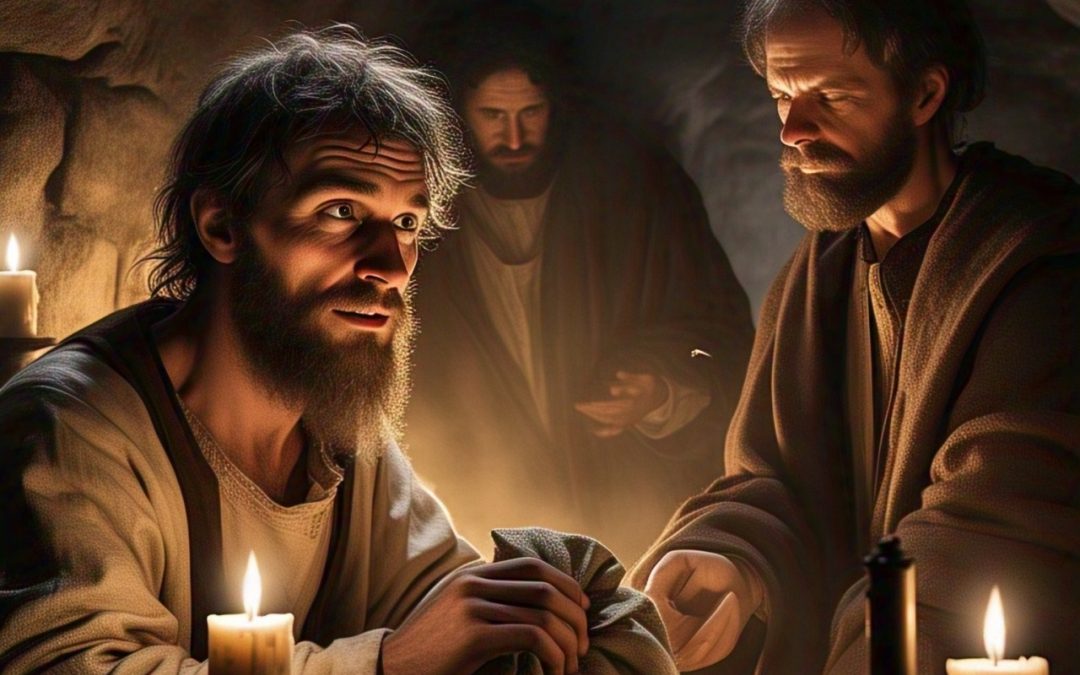
by Eron Henry | Apr 16, 2025 | Lent 2025
Holy Wednesday is a somber milestone in the Passion narrative—a day marked not by grand public teachings or miraculous displays, but by hidden betrayal and sinister plotting. While Jesus continues His ministry, forces of darkness gather in the shadows, revealing the depths of human duplicity and the staggering cost of divine love.
The Gospel accounts of this day focus primarily on Judas Iscariot, who undertakes perhaps the most infamous betrayal in human history. Having walked with Jesus for three years—witnessing His miracles, hearing His teachings, and sharing in His intimate moments—Judas now approaches the religious authorities with a chilling proposition: “What will you give me if I deliver him over to you?” The agreed price—thirty pieces of silver—echoes the ancient valuation for a slave’s life (Exodus 21:32), a paltry sum for betraying the Son of God.
The tragedy of Holy Wednesday lies not merely in the act of betrayal but in its intimacy. Judas was not an outsider or declared enemy, but one who broke bread with Jesus, one who had been trusted with the group’s finances, one who had been called “friend.” His betrayal reminds us that sometimes the deepest wounds come from those closest to us.
Yet amid this darkness, we must recognize God’s sovereign purpose. What appears as the triumph of evil is paradoxically the pathway to humanity’s redemption. The very conspiracy that seeks to eliminate Jesus becomes the means by which salvation is accomplished. The silver that changes hands as blood money will soon purchase a potter’s field, fulfilling ancient prophecy (Zechariah 11:12-13).
Holy Wednesday challenges us to examine our own hearts. Like Judas, we too can harbor mixed motives, disappointments with God’s plans, or secret sins that gradually distance us from Christ. What begins as small compromises can culminate in betrayal if left unaddressed. Yet unlike Judas, we are offered the opportunity for genuine repentance and restoration.
Prayer
Lord,
On this Holy Wednesday, we pause to remember how You were sold for thirty pieces of silver by one who called You friend. Your heart knew the pain of betrayal even as You continued the journey toward the cross.
Search our hearts today. Reveal to us the ways we too have betrayed You—through our silence when we should speak, our compromise when we should stand firm, our denial when we should acknowledge You before others.
Guard us from the self-deception that allowed Judas to rationalize his actions. Show us our true motivations and purify our hearts from all that is not of You.
We confess that like Judas, we have valued lesser things above You—comfort, security, reputation, wealth. Forgive us for the times we have traded Your presence for worldly gain.
In a world of betrayal and broken trust, make us people of integrity and faithfulness. By Your Spirit, empower us to remain loyal to You even when the path is difficult or unpopular.
May we never forget the cost of our redemption, purchased not with silver or gold, but with Your precious blood.
In the name of Christ, who endured betrayal to secure our salvation.
Amen.
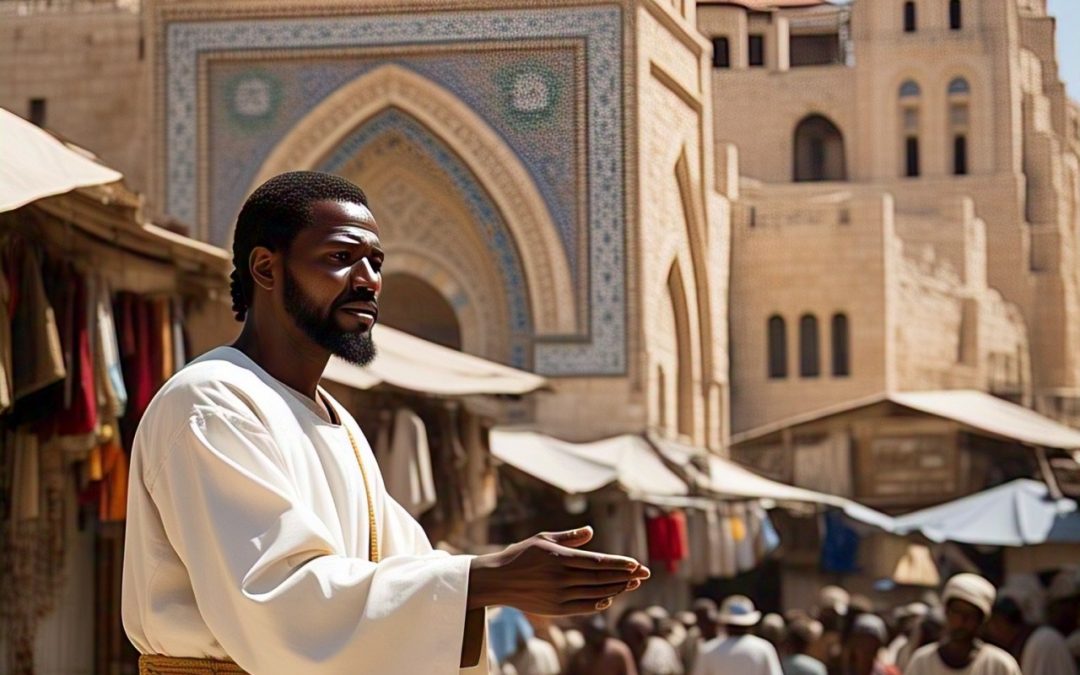
by Eron Henry | Apr 15, 2025 | Lent 2025
After cleansing the Temple the previous day, Jesus returns to Jerusalem to engage in some of His most profound and challenging teachings. This day reveals a Messiah who confronts religious hypocrisy and articulates divine truth with unwavering authority.
In the Temple courts, Jesus faces a barrage of questions designed to trap Him. The religious and political powers conspire to undermine His growing influence, yet each encounter reveals their spiritual bankruptcy and highlights Christ’s divine wisdom. When asked about paying taxes to Caesar, He deftly avoids their trap: “Give to Caesar what is Caesar’s, and to God what is God’s.” When the Sadducees attempt to discredit the resurrection with a convoluted scenario, Jesus exposes their misunderstanding of both scripture and God’s power.
The parables Jesus shares this day are particularly pointed. The Parable of the Tenants directly confronts the religious leaders, portraying them as corrupt stewards who have violated their sacred trust. The Parable of the Wedding Banquet warns that many who seem invited to God’s kingdom will ultimately reject it, while unexpected others will fill the banquet hall.
Perhaps most sobering is the Olivet Discourse, where Jesus foretells both the destruction of the Temple and the end of the age. He reminds His followers to remain vigilant and faithful, for no one knows the day or hour of His return.
Holy Tuesday challenges us to examine whether we truly recognize divine authority or merely pay it lip service. It asks whether we are like the religious leaders who knew scripture but missed its Author standing before them, or like those who humbly received Jesus’ words as truth.
Prayer
Lord of Truth and Authority,
On this Holy Tuesday, we remember how You stood in the Temple courts, speaking truth that confounded the wise and powerful of this world. Your words cut through pretense and illuminated hearts.
Examine us today as You examined the religious leaders then. Where we have embraced appearances over substance, correct us. Where we have twisted Your word to suit our desires, straighten our thinking.
Grant us discernment to recognize Your voice amidst the competing claims of our age. Help us to be not merely hearers of Your word, but faithful doers who build our lives on the solid foundation of Your truth.
May we live in constant readiness for Your return, with lamps trimmed and hearts prepared. Keep us from growing complacent or distracted by the concerns of this world.
We submit to Your authority, Christ Jesus, knowing that in Your wisdom alone can we find the path to life abundant and eternal.
Amen.
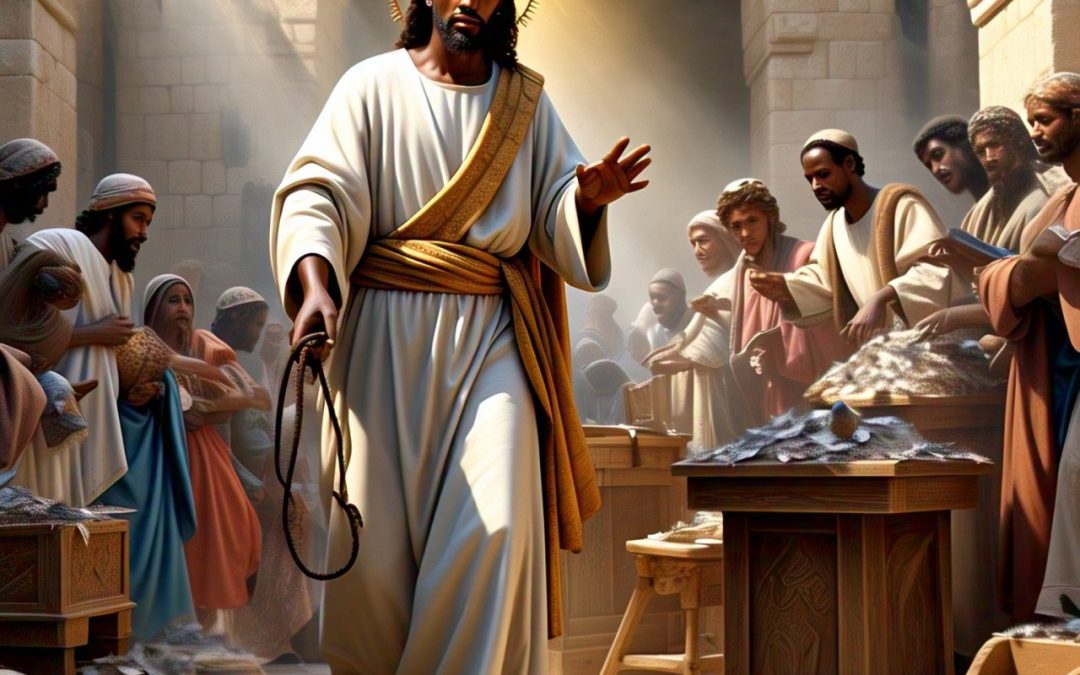
by Eron Henry | Apr 14, 2025 | Lent 2025
Holy Monday marks the beginning of the most sacred week in Christian tradition. Following the jubilant celebration of Palm Sunday, Jesus takes decisive action that reveals the true nature of His kingdom and challenges us to examine our own spiritual fruitfulness.
On this day, two seemingly distinct events become connected: the cursing of the barren fig tree and the cleansing of the Temple. Together, they speak to God’s expectation that faith must bear fruit and that worship must be authentic.
The fig tree, lush with leaves but devoid of fruit, is a metaphor for religious appearance without spiritual substance. When Jesus approaches the tree seeking nourishment, He finds only empty promises. His subsequent action—cursing the tree—is not an act of petulance but a prophetic statement about the consequences of spiritual barrenness.
Hours later, Jesus enters the Temple courts and confronts those who have transformed sacred space into a marketplace. “My house shall be called a house of prayer,” He declares, “but you have made it a den of robbers.” The merchants and money changers had created a system that exploited worshippers while maintaining the appearance of religious devotion—they were fig trees full of leaves but bearing no spiritual fruit.
These acts reveal a Messiah who demands integrity in our relationship with God. Empty ritual and performative piety cannot substitute for a heart that truly seeks to bear the fruits of justice, mercy, and faithfulness.
Prayer
Righteous Lord,
As we walk with You through this Holy Week, confront us as You confronted the Temple merchants. Examine our hearts as You examined the fig tree.
Where we have been content with appearance over substance, forgive us. Where we have exploited others while claiming Your name, correct us. Where our worship has become routine rather than authentic, renew us.
Make us like trees planted by streams of water, bearing fruit in every season. Transform our hearts into true temples where Your presence dwells and where prayer rises like incense before You.
May we never forget that You seek not the mere appearance of devotion, but hearts that overflow with love for You and for our neighbors.
In the name of Christ, who cleanses what is defiled and gives life to what is barren, we pray.
Amen.
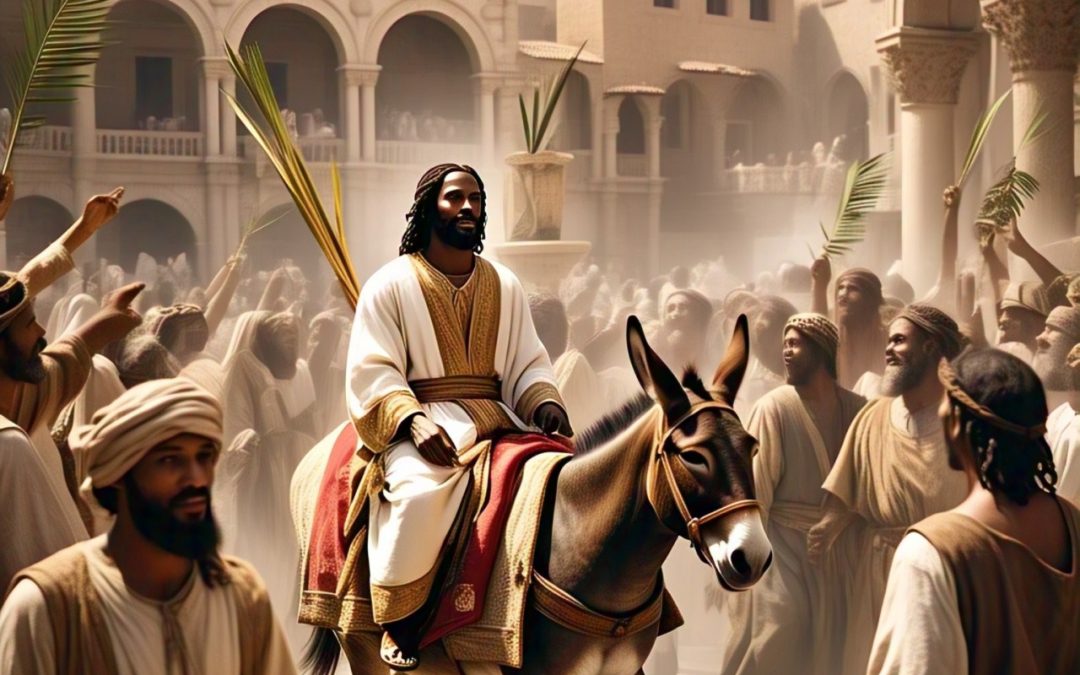
by Eron Henry | Apr 13, 2025 | Lent 2025
Palm Sunday marks the triumphal entry of Jesus into Jerusalem, an event recorded in all four Gospels. As Jesus rode into the city on a donkey, crowds spread palm branches and garments on the road, shouting “Hosanna!” and welcoming Him as the long-awaited Messiah. This moment of jubilation inaugurates Holy Week and sets in motion the events leading to Christ’s passion and resurrection.
Palm Sunday embodies a stark paradox—a triumph that leads to apparent defeat before culminating in ultimate victory. Jesus enters Jerusalem not as a conquering military leader on a warhorse but mounted on a donkey, fulfilling Zechariah’s prophecy: “See, Your king comes to You, righteous and victorious, lowly and riding on a donkey” (Zechariah 9:9). This deliberate choice reveals Christ’s kingdom as one established through humility and peace rather than dominance and violence.
The palms themselves carry rich symbolism. In ancient tradition, palm branches represented victory and were used to welcome returning conquerors. Yet here, they herald a victory that will come through surrender, a conquest achieved through sacrifice. The crowds’ acclamation of “Hosanna” (meaning “save now”) takes on multilayered significance—a plea Jesus will answer, but in ways radically different from their expectations.
Perhaps most striking is the fickle nature of human acclaim revealed in this narrative. Similar crowds that shout “Hosanna!” will, within days, cry “Crucify Him!” This dramatic reversal illuminates the fragility of popularity and the depth of Christ’s commitment to divine purpose rather than public approval.
Palm Sunday offers a powerful critique of triumphalism and superficial faith. It challenges communities to examine whether they seek a Messiah who conforms to their expectations or are willing to follow Christ’s counterintuitive path of servant leadership and sacrificial love.
The reenactment of the palm procession invites contemporary believers into an embodied practice of discipleship, physically moving behind Christ, allowing our bodies to enact what our hearts must learn. As we wave palms and sing “Hosanna,” we participate in a tradition that simultaneously celebrates Christ’s kingship while acknowledging that His throne is the cross.
In our polarized society, Palm Sunday offers wisdom about the nature of true leadership and lasting change. Jesus’ entry models authority exercised through humility rather than force, influence wielded through service rather than dominance. This vision challenges political and cultural systems built on power over others rather than power with and for others.
Jesus’ biblical narrative also speaks to our media-saturated culture’s tendency toward momentary enthusiasm without sustained commitment. It reminds us that meaningful transformation, whether personal, communal, or societal—requires moving beyond symbolic gestures to the difficult work of following Christ’s example, even when the path leads through suffering toward new life.
Prayer
King of Peace who rides on a donkey, as we raise our palms and sing our praise, align our hearts with Your humble way.
When we seek triumph without sacrifice, when we desire crowns without crosses, remind us of Your paradoxical path—That true victory comes through surrender, that authentic power flows from service, that lasting change emerges from love.
Guard us from fleeting enthusiasm, from “Hosannas” quickly forgotten. Instead, grant us courage to follow You through this Holy Week’s unfolding drama, from triumph to table, from garden to trial, from cross to tomb to resurrection dawn.
Shape us into disciples whose praise endures, whose commitment transcends circumstance, whose lives proclaim Your kingdom Not merely with waving branches, but with hands extended in justice and compassion, with feet that walk steadfastly in Your way.
Hosanna in the highest! Blessed is the One who comes in the name of the Lord!
Amen.
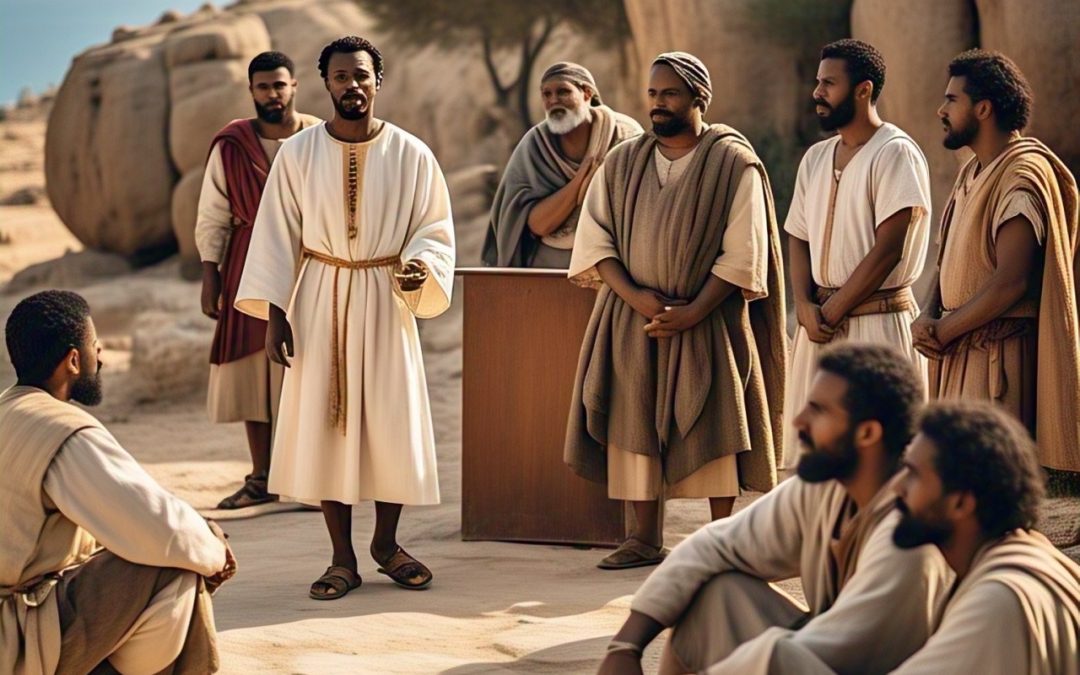
by Eron Henry | Apr 12, 2025 | Lent 2025
The Gospel of John boldly declares that “the Word became flesh and made His dwelling among us” (John 1:14), establishing continuity between the divine Logos present at creation and the human Jesus of Nazareth. This incarnation answers humanity’s perennial question: What is God really like? In Christ, abstract theological concepts about divine attributes find concrete expression in a human life. God’s power and will become accessible and interpretable through Jesus’ teachings, actions, relationships, and ultimate self-giving.
As the writer of Colossians affirms, “He is the image of the invisible God” (Colossians 1:15), suggesting that when we see Jesus, we see the Creator’s true face. The same divine power that spoke the universe into existence now expresses itself through healing touches, authoritative teachings, compassionate encounters, and ultimately, redemptive suffering.
In Jesus, divine power manifests not primarily through cosmic demonstrations but through transformative presence. The Creator’s omnipotence is channeled into specific acts of restoration—sight to the blind, dignity to the outcast, community to the isolated, forgiveness to the condemned. This represents not a diminishment of divine power but its most authentic expression, revealing that God’s highest purpose is not domination but relationship and reconciliation.
Perhaps most profoundly, the cross and resurrection reveal the Creator’s will to absorb the consequences of creation’s brokenness rather than imposing judgment from a distance. As Karl Barth observed, God’s omnipotence is most fully displayed not in abstract capacity to do anything, but in the freedom to determine what kind of power to exercise, the power of self-giving love.
The incarnation establishes continuity between the Creator’s original intentions and ultimate purposes. The same divine will that called forth light from darkness now shines “in our hearts to give us the light of the knowledge of God’s glory displayed in the face of Christ” (2 Corinthians 4:6). Jesus represents not a divine afterthought or emergency response but the fulfillment of creation’s trajectory, the revelation that God’s creative power has always been directed toward communion.
This perspective transforms our understanding of both creation and redemption, revealing them as complementary expressions of the same divine character. The God who delighted in bringing forth biodiversity and cosmic complexity is the same God who enters human particularity to initiate new creation from within.
Prayer
Eternal Creator, revealed in Jesus, You who shaped galaxies have shaped Yourself into human form, translating divine power into a language we could comprehend.
We stand in wonder before this mystery, that Your omnipotence finds fullest expression not in cosmic displays of force, but in a servant’s touch, a teacher’s wisdom, a healer’s compassion, a savior’s sacrifice.
Open our eyes to recognize Your true face, that when we look upon Jesus, we might see not merely a historical figure, but the very heart of the universe made visible.
Reshape our understanding of power by the pattern of Christ’s life—power that lifts up rather than dominates, power that restores rather than controls, power that connects rather than coerces.
As bearers of Your image, may we reflect the same creative will that we see in Jesus, to heal what is broken, to welcome what is marginalized, to forgive what seems unforgivable, to create new possibilities where hope seems lost.
Through Christ, who reveals Your glory.
Amen.

by Eron Henry | Apr 11, 2025 | Lent 2025
When Jesus proclaimed, “The kingdom of God has come near” (Mark 1:15), he was announcing not merely a spiritual reality but an alternative social ordering with concrete implications. This kingdom operates by principles that consistently invert prevailing wisdom: the first shall be last; true greatness comes through service; abundance emerges through sharing rather than hoarding; enemies are to be loved rather than conquered.
The Beatitudes (Matthew 5:3-12) perhaps most clearly articulate this alternative ordering. Those typically considered disadvantaged—the poor in spirit, the meek, those who mourn, those who hunger for justice—are declared blessed. This represents not merely a reversal of fortune but a fundamental reordering of what constitutes the good life, challenging acquisitive economics, competitive hierarchies, and retributive justice.
This alternative ordering was not merely taught by Jesus but embodied in His life. The incarnation itself—God entering human vulnerability rather than remaining in splendid isolation—models relationship over detachment, solidarity over superiority. Jesus’ table fellowship with social outcasts, His prioritization of mercy over ritual purity, His willingness to touch the untouchable, all demonstrate a radical reordering of human community around inclusion rather than exclusion.
Most dramatically, Christ’s journey to the cross reveals a God who refuses to participate in cycles of violence, choosing instead to absorb violence without retaliation. This represents not divine powerlessness but an alternative form of power that transforms rather than dominates, that reconciles rather than conquers.
This alternative ordering challenges both individual lives and communal structures. For individuals, it invites a reorientation of priorities, from achievement to faithfulness, from self-protection to vulnerable love, from fear-based security to trust-based generosity.
For communities and institutions, Christ’s alternative offers prophetic critique of systems built on domination, exclusion, and exploitation. It suggests that human flourishing emerges not through competitive individualism but through practices of mutuality, not through accumulation but through equitable distribution, not through hierarchies of worth but through recognition of universal dignity.
The church, when faithful to its calling, exists as a community experimenting with this alternative ordering, not merely as a spiritual refuge but as a laboratory for different ways of structuring economic relationships, resolving conflicts, exercising authority, and creating belonging across social divides.
Prayer
Disruptive God, revealed in Jesus, You who turned water to wine also turn our expectations upside down, our hierarchies inside out, our certainties into questions.
We confess how deeply we have internalized the world’s ordering of things, where worth is measured by productivity, where security comes through control, where success means rising above others, where happiness is found in accumulation.
By Your Spirit, reorder our desires according to Christ’s strange wisdom: that true wealth lies in giving, that authentic greatness flows from service, that lasting security rests in trust, that joy abounds in communion.
Make us courageous enough to experiment with Your alternative ordering in our personal choices, in our family dynamics, in our economic decisions, in our communal structures.
When we are tempted to return to the familiar patterns of power and privilege, remind us of the One who took a towel and basin, who touched lepers and loved enemies, who forgave executioners and welcomed outcasts, revealing in each action Your vision for human flourishing.
May our lives become parables of Your kingdom, imperfect but authentic witnesses to the better way revealed in Jesus Christ.
Amen.

by Eron Henry | Apr 10, 2025 | Lent 2025
The resurrection of Jesus Christ creates a new social reality. When early Christians proclaimed “He is risen,” they weren’t merely asserting a supernatural event but announcing the inauguration of God’s renewed world operating according to resurrection principles rather than the scarcity and self-protection that characterize fallen existence.
This resurrection faith naturally flows into practices of generosity and compassion. We see this connection clearly in the earliest Christian communities described in Acts, where believers “had all things in common” and “there was not a needy person among them” (Acts 4:32-34). This wasn’t incidental to their faith but a direct expression of resurrection conviction. Death’s defeat undermines the fear-based economics of accumulation and self-preservation.
If God has conquered death—our ultimate limitation—then limitations of resources need not govern our relationships with others. Resurrection faith liberates us from the anxiety that drives hoarding and indifference. If God’s abundance has overcome death’s scarcity, believers can risk generosity without fear of depletion.
This connection appears particularly in Paul’s collection for Jerusalem’s poor. He grounds this financial appeal not in guilt or obligation but in Christological generosity: “For you know the grace of our Lord Jesus Christ, that though he was rich, yet for your sake he became poor, so that you by his poverty might become rich” (2 Corinthians 8:9). Christ’s self-emptying movement from life through death to resurrection establishes the pattern for Christian generosity.
What makes resurrection-inspired compassion distinctive is its hopeful character. Unlike compassion driven by mere sympathy or social obligation, Christian generosity flows from conviction about ultimate reality, that God’s life-giving power has overcome death’s hold. This gives compassionate action a particular quality that combines present engagement with future hope.
Resurrection faith thus creates a community marked by what we might call “eschatological economics,” practices of sharing and care that anticipate the world’s ultimate restoration. The believer’s generosity becomes not just an ethical response but a proclamation that death and scarcity no longer have the final word.
In a world still deeply marked by fear, accumulation, and indifference, resurrection-shaped generosity is a powerful witness that another reality is possible where abundance rather than scarcity sets the terms for human relationship.
Prayer
God of Abundant Life,
You have not merely conquered death but established a new creation governed by generosity rather than fear. The empty tomb proclaims that scarcity, self-protection, and death itself have been overcome by Your life-giving power.
We confess that despite claiming resurrection faith, we often live according to the old economics of anxiety and accumulation. We clutch tightly to possessions, time, and security as though these were ultimately ours to control. Forgive our practical atheism that affirms Christ’s rising with our lips but denies its implications in our financial choices and relational priorities.
Transform our hearts and hands by resurrection power. Free us from the fear that inhibits generosity and the apathy that blinds us to others’ needs. Replace our scarcity mindset with abundant trust that You who conquered death can surely sustain us as we share freely with others.
Guide us to particular acts of compassion that embody resurrection hope in tangible ways, sharing resources, offering hospitality, advocating for justice, extending forgiveness, and creating communities where “there is no needy person among us.”
When generosity feels risky or compassion becomes costly, remind us of the empty tomb and its promise that giving does not deplete but participates in Your divine abundance. May our open hands and open hearts become living testimonies that Christ is risen indeed.
Through Jesus Christ, the firstfruits of the new creation, who lives and reigns with You and the Holy Spirit, one God, forever and ever.
Amen.

by Eron Henry | Apr 9, 2025 | Lent 2025
The cross—Christianity’s central paradox—was an instrument of torture and death that Christians proclaim as the very site of God’s decisive victory. This appears nonsensical by conventional standards. Victory typically manifests in visible power, overwhelming force, and the defeat of enemies. Yet the cross presents the opposite: apparent weakness, submission, and defeat.
This paradox illuminates an important truth: God’s victory operates according to different principles than human conquest. On Golgotha, God achieved triumph not by avoiding suffering but by entering fully into it. What appeared as defeat—the execution of Jesus—was actually the strategic culmination of divine purpose. As Paul writes, “The message of the cross is foolishness to those who are perishing, but to us who are being saved it is the power of God” (1 Corinthians 1:18).
The hiddenness of this victory was not incidental but essential. Had God’s triumph appeared as conventional victory, it would have merely replaced one domination system with another. Instead, by concealing victory within apparent defeat, God subverted the very logic of worldly power. The cross reveals that God conquers not by coercion but by self-giving love that absorbs violence without replicating it.
Martin Luther’s “theology of the cross” captures this dynamic perfectly. God is revealed precisely where God seems most hidden in weakness, suffering, and death. The cross thus becomes not an unfortunate prelude to resurrection but the very revelation of divine character. God’s strength is made perfect in weakness; God’s wisdom appears as foolishness to the world.
This hidden victory carries profound implications. It suggests that God may be at work most powerfully where appearances suggest divine absence. It indicates that redemption often comes not by escaping suffering but by transformation from within it. And it challenges our preoccupation with visible success, suggesting that authentic victory may look like failure by worldly standards.
The hiddenness of God’s victory in the cross reminds us that divine power operates beneath the surface of history, working not through domination but through seemingly insignificant acts of love, mercy, and faithfulness that ultimately prove more enduring than empires.
Prayer
Mysterious God,
In Your wisdom, You have veiled Your greatest triumph in what appeared to be defeat. At Calvary, where the world saw only humiliation and death, You were accomplishing salvation. Where observers witnessed weakness, You were demonstrating Your greatest strength.
We confess our attachment to visible victory and tangible success. We want triumphant faith that impresses others, not the hidden victory of the cross. We seek divine power that removes suffering rather than transforms it from within. Forgive our resistance to Your upside-down kingdom.
Open our eyes to recognize Your hidden work in our lives and in our world. When circumstances suggest Your absence, help us trust Your presence. When failure seems certain, grant us faith to believe that redemption continues beneath the surface.
Teach us the pattern of the cross – that in surrender we find freedom, in giving we receive, in dying we live. May we embrace this paradoxical wisdom not merely as theological truth but as the very rhythm of our discipleship.
In our suffering, remind us that the cross was not God’s withdrawal but God’s deepest involvement. In our weakness, assure us that Your strength operates most powerfully when human ability reaches its limit.
Through Christ our Lord, who transformed an instrument of death into the means of life abundant, now and forever.
Amen.

by Eron Henry | Apr 8, 2025 | Lent 2025
The resurrection of Jesus Christ represents more than a personal victory over individual mortality; it constitutes God’s decisive triumph over death in all its forms throughout creation. This cosmic scope is essential to grasping Easter’s full significance. God’s victory extends to every dimension where death and chaos threaten God’s good creation.
Scripture consistently presents death as a multifaceted reality. Beyond biological cessation, death manifests as relational breakdown, ecological degradation, systemic injustice, and spiritual alienation. These are not separate problems but interconnected expressions of creation’s bondage to decay (Romans 8:21). Death represents the undoing of God’s creative ordering, the reversion toward chaos that threatens all levels of existence.
The resurrection thus announces that God’s redemptive purpose encompasses the entire created order. In Paul’s vision, Christ’s resurrection initiates a comprehensive restoration that ultimately includes “the redemption of our bodies” (Romans 8:23), the liberation of creation itself from decay, and the final defeat of death as “the last enemy” (1 Corinthians 15:26). This holistic scope appears likewise in Colossians, where Christ’s reconciling work extends to “all things, whether on earth or in heaven” (Colossians 1:20).
What makes this perspective revolutionary is its refusal to restrict its significance to individual salvation. God’s victory over death addresses every aspect of creation’s brokenness—physical bodies, ecological systems, social structures, and spiritual realities. No dimension of existence lies beyond resurrection’s transformative reach.
This comprehensive understanding challenges both reductionist views of salvation and the compartmentalization of faith. It affirms that God’s redemptive concern extends to economic systems, political structures, environmental degradation, and technological developments, not as separate concerns from spiritual matters but as integral aspects of creation’s movement from death to life.
The resurrection thus becomes not merely a past event or future hope but the defining reality that shapes Christian engagement with every dimension of creation. Wherever death and chaos threaten—whether in personal suffering, social injustice, or environmental degradation—the resurrection proclaims God’s intention and power to bring restoration and new life.
Prayer
Jesus our Lord, Redeemer of All,
We praise You that in Your resurrection, You have declared victory over death in all its forms. Your triumph extends to every corner of creation where chaos threatens Your good purposes.
Forgive us for compartmentalizing our faith and limiting the scope of Your redemptive power. We often reduce salvation to spiritual matters alone, failing to recognize Your concern for bodies, relationships, systems, and the entire created order. Expand our vision to see the comprehensive nature of Your victory over death.
Where biological death brings grief, assure us of Your promise of bodily resurrection. Where social systems perpetuate injustice and oppression, empower us to embody resurrection hope through works of justice and reconciliation. Where environmental degradation threatens Your creation, guide us toward practices that nurture rather than exploit the earth.
Give us courage to confront death in all its manifestations, knowing that Your resurrection power works comprehensively to restore all that is broken. Help us resist the temptation to surrender any aspect of creation to chaos as though it lay beyond Your redemptive concern.
When we face seemingly insurmountable challenges—disease, injustice, ecological crisis, or spiritual darkness—remind us that these too fall within the scope of Your Easter victory. Nothing in all creation can separate us from Your love or lie beyond Your power to make all things new.
Hear us Lord Jesus Christ, the firstfruits of the new creation, in whom all things in heaven and on earth are being reconciled.
Amen.







Recent Comments